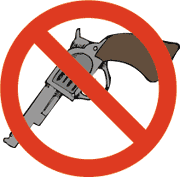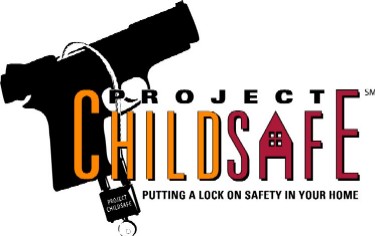

GUN SAFETY
 |
 |
Introduction
Guns are in nearly half of all households in the United States. So even if you don't have one, it's likely that at some point your child will be in a home where there is one. That's why it's important to talk with your child about the potential dangers of guns, and what to do if he or she finds one.
If you do keep a gun in the house, it's vital to keep it out of sight and out of reach of your child. The gun should be kept locked and unloaded, and the ammunition should be stored separately.
Guns and Pretend Play
Allowing your child to have a toy gun is a personal decision, as is how to respond to your child's pretend shooting action during the course of play. Keep in mind that even if you don't allow your child to have a toy gun, your child's friends may have them. So it's wise to explain to your child that real guns - unlike toy guns, or the guns shown on TV, in movies, or in video games - can seriously injure or even kill a person.
Talking to Your Child About Gun Safety
Teach your child to follow these rules from the National Rifle Association (NRA) if he or she comes into contact with a gun:
It's particularly important that your child leave the area where the gun is located to avoid being harmed by another person who doesn't know not to touch it. A child as young as 3 has the finger strength to pull a trigger.
It's also important for your child to tell an adult about the gun that's been found.
If You Have a Gun in Your Home
Many kids are raised with guns in the home, particularly if hunting is an important part of family recreation. If you keep a gun in the home, it's important to teach your child to act in a safe and responsible way around it. To ensure the safest environment for your family:
If you own a gun or have found one in your home and want to dispose of it, call your local police station. Do not dial 911 or an emergency line. Laws differ between states, but generally, the firearm will be checked to ensure it was not part of a criminal investigation and then it will be destroyed.
Community "buy-back" or "amnesty" days are another disposal option. These programs allow people to bring unwanted guns to a designated place where they will be made unusable. To find out if your community hosts such a program, contact your local police department - but don't wait until such a program becomes available to dispose of an unwanted firearm.
Gun Safety Outside Your Home
Gun safety does not end when your child leaves your home. Your child could come in contact with a gun at a neighbor's house, when playing with friends, or under other circumstances away from home. It's a good idea to discuss gun safety with other family members or the parents of your child's friends if your child spends time in their homes. It may feel like an awkward conversation, but the person you ask will likely understand that you only have you're child's safety in mind.
A Word About BB Guns
BB guns and pellet guns are not regulated by the government. The U.S. Consumer Product Safety Commission recommends that kids under the age of 16 not use high-velocity BB guns or pellet guns. If your child has a BB gun, or is likely to come into contact with one, it's important your child knows to never point it at anyone, including himself or herself.
Disclaimer: This information is not intended be a substitute for professional medical advice. It is provided for educational purposes only. You assume full responsibility for how you choose to use this information.
Updated and reviewed by: Kathleen M. Cronan, MD
Date reviewed: August 2005